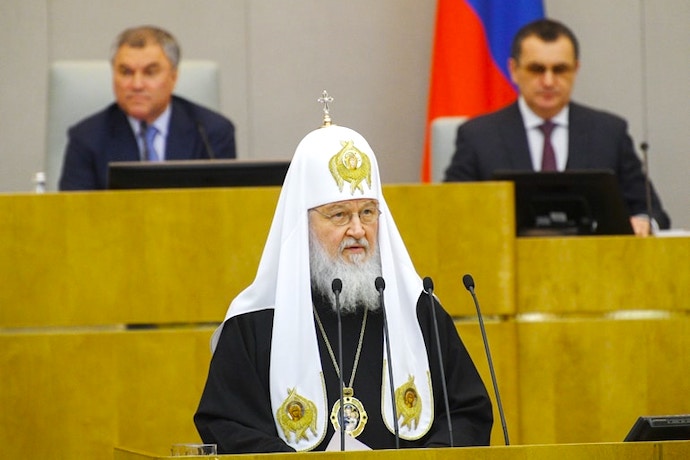On May 17, Patriarch Kirill of Moscow addressed the upper house of the Russian Parliament in a speech that highlighted the role of the Russian Orthodox Church and its primate as a propaganda agent par excellence for the Putin regime. It also demonstrated, once again, the extent to which the Russian state and the Russian Orthodox Church rely upon a version of history that is utterly foreign to most of the West, and yet is utterly common in the Orthodox Christian world, even beyond Russia. Unfortunately, Western media have all but ignored this element of Russian propaganda, in no small part because the history itself is so foreign to its audience. They (understandably) want to report the news, not give a lecture in Eastern European history.
At the same time, this oversight speaks to a larger problem in how we report on and discuss the role of history in current events, particularly as it relates to religion. The Abrahamic religions, in particular, are deeply invested in their historical narratives. The God of Judaism, Christianity, and Islam is a god of history, a god who intervenes in human events and seeks to mold the narrative of history to a particular end. History, thus, becomes a sacred narrative for these faiths. Consequently, challenging a faith tradition’s version of history in this context is akin to challenging the faith itself. And we know how the media feels about that.
During the speech, Kirill focused on the idea that “…the people of Russia and Ukraine, who emerged from the common Kyiv Baptismal font, are united by the Orthodox faith and bound by a common historical destiny…” [Religion Dispatches original translation.]
Furthermore, he recalled specific events from the past nearly six-hundred years that are widely known in the Orthodox Christian world, and particularly in Russia, to signify the West’s attempts to undermine the political power of Orthodox states and to (worse yet) subsume Orthodoxy into the Christian West: the Union of Brest in 1596 and the 17th-century betrayal of Ivan Mazepa.
(Before I explain both, raise your hand, dear American Reader, if you’ve heard of either… That’s what I thought).
First the Union of Brest: In 1588, the Patriarch of Constantinople, Jeremias II, traveled to the Polish-Lithuanian Commonwealth and the Grand Duchy of Moscow and formally acknowledged the Russian Orthodox Church, which had claimed its own independence since 1458, in the wake of the fall of the Byzantine Empire to the Ottomans. This event is very important for contemporary Russian claims to Ukraine. After all, Kyiv, not Moscow, is the birthplace of Slavic Orthodoxy.
And the chief bishop of the Slavs moved from Kyiv to Moscow for political, not theological, reasons. Without Jeremias’s trip, the historical claim for Moscow’s authority over the Ukrainian Church disappears. In fact, without Jeremias’s trip, the argument could easily run in the other direction: i.e., that Moscow should be under the authority of Kyiv. Jeremias also deposed the existing metropolitan bishop of Kyiv and replaced him with a more friendly metropolitan.
Well, it turns out the idea of Moscow as the center of secular and religious power in Eastern Europe was just as controversial in the 16th century as in the 21st. After Jeremias left, nine out of the ten local bishops in the affected regions gathered in the Brest and voted to join with the Roman Catholic Church. The Greek Catholic Church is a product of this event.
Patriarch Kirill also mentioned Ivan Mazepa’s “betrayal” to an audience that effectively constitutes the Russian senate. A Ruthenian-Lithuanian noble man born around 50 years after the Union of Brest, Mazepa was by all accounts well-educated and cosmopolitan. He spent a great deal of time in Western Europe and even served as a courtier to the Polish king, experiences that would make him suspect as potentially “Catholized” by the Russian state.
Nonetheless in 1687, he was made Hetman (essentially a general) of the Zaporizhian Host in what is now Ukraine. In 1708, in the midst of the Great Northern War, upon learning that he was going to be deposed by the Tsar of his position as Hetman, Mazepa deserted his army and joined the forces of King Charles XII of Sweden.
A Russian victory at the Battle of Poltava meant that Mazepa’s intention of bringing Ukraine into Swedish possession would never be realized, but the consequences of his changing sides have reverberated throughout Ukrainian and Russian history. Kirill’s claim that Mazepa has been recently rehabilitated in Ukraine is nothing short of accusing the current Ukrainian government of a similar betrayal, not just of Russia, but of Orthodoxy itself. After all, Mazepa’s name is one of those read alongside other anathematized people and ideas during the Sunday of Orthodoxy, the first Sunday of Lent. The message is clear: to betray Russia is to betray the Orthodox Faith, perhaps even to betray Christ himself.
To be clear, Kirill is not wrong that Ukrainians are more divided on Mazepa’s legacy. Polling shows that about a third of Ukrainans see him as a “man who fought for Ukraine’s independence,” while nearly a quarter see him as a traitor. And the former president of Ukraine, Viktor Yushchenko, wouldn’t rule out the idea that his family was connected to the former Hetman. He even had a statue of him built in the middle of Kyiv.
But that’s kind of the point. History isn’t just a series of things that happened. History is what we think those events mean. Our interpretations usually have everything to do with the present and very little to do with the past. To see this, one need look no further than America’s own contentious political debate about how its racial history ought to be taught*: Is the story of American race-based chattel slavery a story of glorious triumph over racism and oppression—proof of American exceptionalism? Or is it a story of continuing prejudice and violence that reveals American exceptionalism as a lie and America as a fundamentally racist society? Clearly this is a question that has much more to do with our century than that of Abraham Lincoln.
This is also, to be clear, a religious question. For many American Christians, particularly some American evangelicals and members of the Latter-day Saint movement, American history is as sacred and theologically charged as medieval and early modern Eastern Mediterranean and Eastern European history is for Orthodox Christians. If you believe in a God of History, you inevitably also believe your own history is divinely-mandated and so look to it for proof of your own righteousness.
Patriarch Kirill is not doing anything different than his friend Franklin Graham—and both men clearly understand that the history of their respective nations is a Christian one, ordained by God. This is a dangerous way of thinking, but it’s all the more dangerous if we don’t know what the hell they’re even talking about. Which is why history is always worth knowing.
*This is in no way intended to suggest that both are legitimate, ethical, and equally supported by professional historians—just that they demonstrate how dramatically opposed interpretations of history can be.





